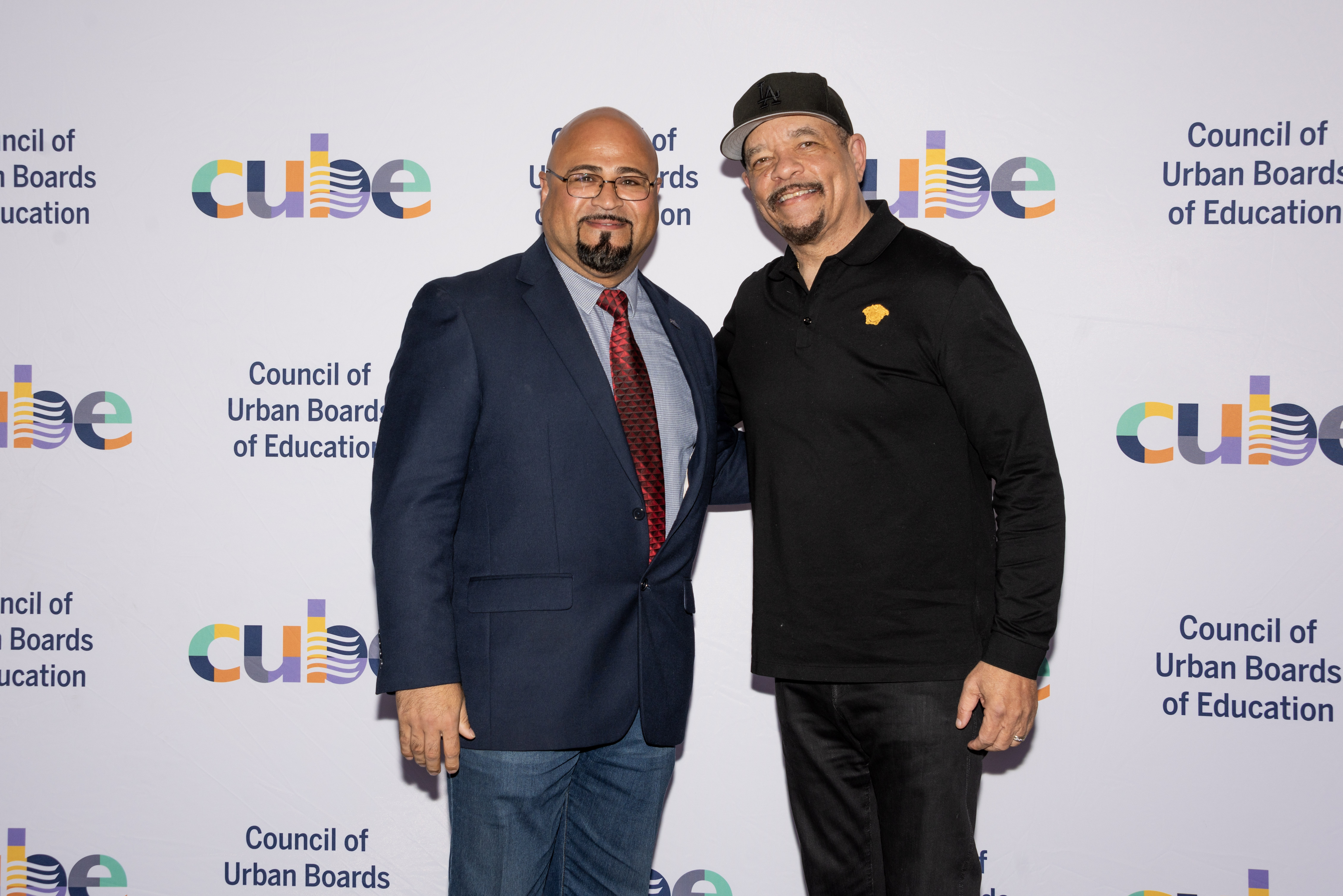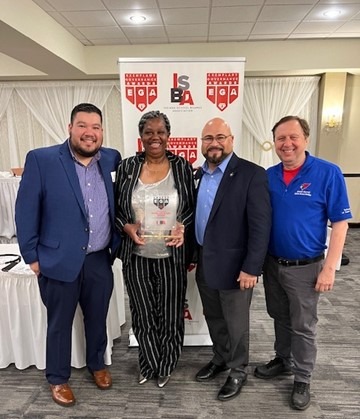From the boxing ring to the boardroom, the new CUBE chair brings his leadership skills to the role
A school board trustee for Indiana’s School City of East Chicago, Joel Rodriguez says the Council of Urban Boards of Education gives its members a platform to say, “These are our issues, challenges, and successes, and this is how we’re going to work together to better public education in urban districts.”
July 14, 2025

JOEL RODRIGUEZ WITH GRAMMY-AWARD WINNING RAPPER, ACTOR, AND AUTHOR ICE-T, A KEYNOTE SPEAKER AT THE 2023 CUBE ANNUAL CONFERENCE.
PHOTO CREDIT: NSBA
Joel Rodriguez’s professional experience includes work in municipal government, community advocacy, and school board leadership. He’ll put the knowledge and insights he’s gained, and his commitment to collaboration, equity, and education, to work as the new steering committee chair of the National School Boards Association’s Council of Urban Boards of Education (CUBE).
“CUBE tells my story,” and the story of so many other urban district leaders dedicated to strengthening school board governance to improve education for the children in their communities, says Rodriguez, a board trustee for Indiana’s School City of East Chicago (SCEC) since 2013.
CUBE provides a national platform for school board members to say, “These are our issues, challenges, and successes, and this is how we’re going to work together to better public education in urban districts.” Through seminars, conferences, research, and advocacy, the organization fosters innovative solutions to the unique challenges of urban education and creates an environment for school leaders to network, collaborate, learn, and grow, he adds.
 RODRIGUEZ AND OTHER SCHOOL CITY OF EAST CHICAGO TRUSTEES CELEBRATE AN AWARD FOR EXEMPLARY GOVERNANCE RECEIVED AT THE 2024 INDIANA SCHOOL BOARDS ASSOCIATION CONFERENCE.
RODRIGUEZ AND OTHER SCHOOL CITY OF EAST CHICAGO TRUSTEES CELEBRATE AN AWARD FOR EXEMPLARY GOVERNANCE RECEIVED AT THE 2024 INDIANA SCHOOL BOARDS ASSOCIATION CONFERENCE.
PHOTO COURTESY OF JOEL RODRIGUEZ
For more than 50 years, CUBE has been helping school districts strive for excellence. CUBE currently represents over 85 urban and urban-like school districts in 23 states and the U.S. Virgin Islands. CUBE districts educate nearly 8 million students in almost 12,000 schools with a collective budget of $99 billion.
The CUBE Steering Committee leads and guides the council. It is comprised of 11 school board members (four officers selected by the Steering Committee and seven school board members elected by representatives of the school districts participating in the CUBE program). NSBA’s president and executive director serve as ex officio members. As the CUBE Steering Committee Chair, Rodriguez serves as an ex officio voting member on the NSBA Board of Directors. He also is a proud member of the Indiana School Boards Association (ISBA) Board of Directors.
PERSPECTIVE ON SOCIAL AND ECONOMIC FACTORS
Rodriguez was a newly minted trustee on the SCEC school board when he attended his first CUBE networking luncheon during NSBA’s 2013 Annual Conference. The speakers, messaging, focus, and enthusiasm “transformed me in terms of wanting to really get involved,” he recalls. In addition to participating in CUBE, where he eventually became a Steering Committee member, Rodriguez joined NSBA’s National Hispanic Council of School Board Members, serving as a regional director.
As an administrator for the Lake County Board of Elections and Registration for about 14 years, Rodriguez says, “That role has always given me a perspective on some of the social and economic factors that influence our educational outcomes here in Indiana.” He also was deeply focused on those factors in an earlier position as the special assistant for economic development in nearby Gary, Indiana.
In 2012, Rodriguez ran for and won a seat on the newly established elected school board in his hometown of East Chicago. It was the first elected school board in the district in over 85 years. The largely Latino and Black community spoke and expressed its desire for more transparency and involvement through an elected board compared to the previous appointed board, Rodriguez says. Today, he is the longest-tenured member on the elected board.
CONTINUING TO MOVE FORWARD
Located in northwest Indiana, 37 miles from downtown Chicago, East Chicago was incorporated in 1893 as a railroad and steel town. Once a booming industrial center dominated by oil refineries, lead smelters, and chemical and steel plants, East Chicago was hit hard by the decline of steel production and manufacturing in the 1970s. Like many other school communities in the nation’s urban core, the 3,200-student SCEC district has struggled with population shifts and declines, high poverty, growing student needs, insufficient funding, and other challenges.
For example, in 2016, the U.S. Environmental Protection Agency notified residents in one East Chicago neighborhood that the ground around them was contaminated with lead and arsenic. This led to the displacement of at least 1,000 families and the relocation of over 400 students, with some families opting to leave the school district. “That equated to close to 382 children that we’ve actually lost in our school system,” Rodriguez says.
Despite its challenges, the community where he grew up and graduated from high school continues to move forward. “We’ve turned the tide a bit with our focus on student success,” Rodriguez says. The district’s Student Support Teams initiative was recognized by NSBA’s 2025 Magna Awards program for fostering academic growth and emotional well-being through personalized interventions.
A proud graduate of East Chicago Central High School, Class of ’89, Rodriguez recalls being passionate about two extracurricular activities—boxing and drama. He laced up his first pair of boxing gloves at age 11, and as a teenager made it to the prestigious Chicago Golden Gloves amateur boxing championships, winning sectional titles over consecutive years. “I think that boxing is what kept me off the streets,” he says.
In high school, he also discovered a love for music and theater. In his school’s drama program, he played the lead in “Jesus Christ Superstar” and the head-strong Riff in “West Side Story.” He recalls the joy in “just working together with my peers and putting together a successful show. I was really happy about that.”
It’s no surprise that Rodriguez is a huge advocate for the arts in education, noting that they offer another valuable avenue for teaching, learning, and student engagement. Like sports programs, however, arts programming requires funding that is increasingly difficult to provide.
TRYING TIMES IN PUBLIC EDUCATION
“We’re tightening our belts and figuring out other ways that we can survive,” he says, but the need for critical funding isn’t new and can’t be ignored. “Urban districts have always been a target for lack of funding, not only from the state level, but also from the federal level. It’s important for us to continue to advocate for that, to continue to fight for public education.” That fight is one reason that participation in NSBA and CUBE is so important, he says.
The opportunity for networking with and sharing experiences, insights, and advocacy with board members from across the country is critical to improving outcomes for students who have traditionally been underrepresented and underserved, and deserve better, he adds.
Rodriguez was encouraged to hear Pedro Noguera, dean of the University of Southern California School of Education, so accurately highlight some of the challenges facing school board leaders during his keynote presentation at the CUBE luncheon during NSBA’s 2025 Annual Conference.
Noguera underscored that these are trying times in public education, with declining enrollments, political challenges coming from Washington, D.C., expanding academic and social needs among students, and mounting pressures facing teachers, administrators, and families.
Through it all, Noguera stressed that school board members must remain leaders rooted in justice and equity in order to serve all students effectively.
It’s vital that CUBE continues to empower and support urban school board members across the country to address systemic inequities and improve educational outcomes, Rodriguez says. This can be done by taking every opportunity for collaboration, engagement, and leadership at the local, state, and national level. “As long as we keep fighting for the same goal, which is student achievement, we’re going to win. But we have to continue being engaged.”
(Rodriguez's graduation year was originally misstated. The error has been corrected above.)